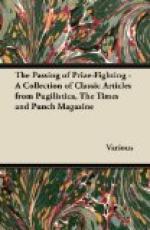Once I remarked that on German crimes
would follow
“Perdition eternal”;
Heaven would make this its care,
Nor need to be hustled, with
plenty of time to spare.
Those words of mine I have a desire to
swallow,
Finding, on further thought, which admits
my offence,
That a few brief years of
Coventry, of denied
Communion with Culture—used
in the Oxford sense—
Are ample for getting our difference rectified.
What is a Laureate paid for, I ask The
Times,
If not to recant in prose his patriot
rhymes?
I stamp my foot on my wrath’s last
smouldering ember,
And for my motto I take “Lest
we remember.” O. S.
* * * * *
=THE SUPERFECTION LAUNDRY.=
I let myself into my flat to find a young woman sitting on one of those comfortless chairs designed by upholsterers for persons of second quality who are bidden to wait in the hall.
“You want to see me?” I inquired. “Yes; what is it?”
“I have called, Madam, to ask if you are satisfied with your laundry.”
“Far from it,” I said. “It is kind of you to ask, but why?”
“Because I wish to solicit your custom for the laundry I represent.”
“What faults do you specialise in?” I inquired.
“I beg your pardon, Madam?”
“Will you send home my husband’s collars with an edge like a dissipated saw?”
The young woman’s face brightened with comprehension.
“Oh, no, Madam,” she replied. “We exercise the greatest care with gentlemen’s stand-up collars.”
“Will you shrink my combinations to the size of a doll’s?”
An expression of horror invaded her countenance. “The utmost precaution,” she asserted, “is taken to prevent the shrinkage of woollens.”
“Is it your custom to send back towels reduced to two hems connected by a few stray rags in the middle?”
The young woman was aghast. “All towels are handled as gently as possible to avoid tearing,” she replied.
“How about handkerchiefs?” I asked. “I dislike to find myself grasping my bare nose through a hole in the centre.”
The suggestion made my visitor laugh.
“Are you in the habit of sewing nasty bits of red thread, impossible to extricate, into conspicuous parts of one’s clothing?”
“Oh, no, Madam,” she asseverated; “no linen is allowed to leave our establishment with any disfiguring marks.”
“You never, I suppose, return clothing dirtier than when it reached you?” I proceeded.
Suppressed scorn that I could believe in such a possibility flashed momentarily from her eyes before she uttered an emphatic denial.
“Nor do you ever perhaps send home garments belonging to other people while one’s own are missing?”
“Never, I can assure you, Madam.”
“Does the man who delivers the washing habitually turn the basket upside down so that the heavy things below crush all the delicate frilly things that ought to be on top?”




